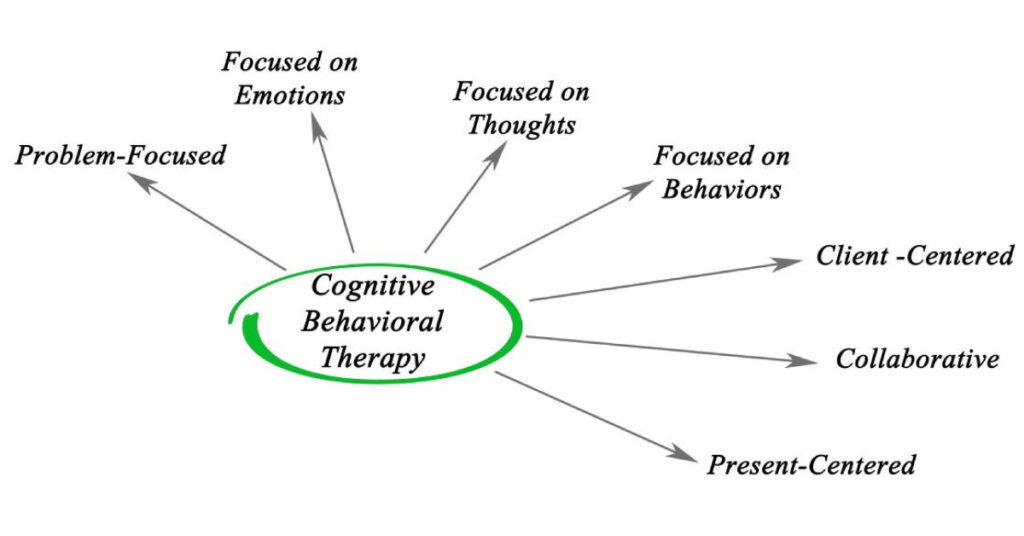
Cognitive Behavioral Therapy (CBT) is a widely recognized, evidence-based therapy technique that has been shown to effectively treat anxiety, depression, eating disorders and trauma. It also works well to help manage stress and insomnia and physical issues such as migraine, IBS and chronic pain.
CBT is very user-friendly and focuses on identifying and challenging the unhelpful negative thoughts and beliefs we have that are keeping us stuck emotionally. Cognitive = thought and Behavior = the things we do, typically subconsciously, that keep us trapped in unhelpful patterns. By understanding the connection between our thoughts, feelings, and behaviors, this type of therapy helps people develop healthier and more adaptive ways of thinking about things that affect their emotions and develop better coping strategies for stressful situations.
After reading this blog post, I hope you will understand what CBT is, what conditions it is useful in treating, and a beginners guide on how to start using the techniques. I will be describing 10 of the most common types of unhelpful negative thoughts, and then provide some practical examples on how to challenge them effectively.
What is Cognitive Behavioral Therapy (CBT)?

Cognitive Behavioral Therapy (CBT) is a form of psychotherapy that aims to help individuals understand and change their patterns of thinking and behavior. Developed by psychologist Aaron T. Beck in the 1960s, CBT has become one of the most widely used therapeutic approaches for a range of mental health conditions.
The core principle of CBT is that our thoughts, emotions, and behaviors are interconnected. CBT emphasizes the importance of identifying and challenging negative or distorted thoughts, as they often contribute to emotional distress and unhelpful behaviors. By addressing these thoughts, individuals can develop more positive and realistic thinking patterns, leading to improved mental well-being.
10 Types of Unhelpful Negative Thoughts
When using CBT, several types of unhelpful negative thoughts are commonly identified. Recognizing these patterns can be instrumental in challenging and re-framing them. Let’s explore ten of the most prevalent types of negative thoughts:
1. Overgeneralization: Drawing broad conclusions based on isolated incidents. Example: “I made that mistake, I always mess things up.”
2. Mental Filtering: Focusing only on the negative aspects of a situation while ignoring any positive ones. Example: “I received several compliments on my presentation, but I can’t stop thinking about the one critical comment.”
3. Disqualifying the Positive: Discounting positive experiences or accomplishments as insignificant. Example: “I only got the promotion because they felt sorry for me.”
4. Jumping to Conclusions: Making negative assumptions about situations or others without evidence. Example: “She didn’t respond to my text; she must be mad at me.” This type of thought can also be called Mind Reading where you believe that you know what others are thinking or feeling without evidence. Example: “My boss didn’t smile at me today; she must be disappointed in my performance.”
5. Catastrophizing: Magnifying the importance or impact of a situation, assuming the worst possible outcome. Example: “If I don’t get this job, my career is ruined forever.”
6. Personalization: Assuming excessive responsibility for events or situations that are beyond personal control. Example: “My friend canceled our plans; it must be because I did something wrong.”
7. Should Statements: Imposing rigid expectations on oneself or others. Example: “I should always be able to handle everything perfectly.”
8. Emotional Reasoning: Believing that emotions reflect the objective reality of a situation. Example: “I feel anxious, so something terrible must be about to happen.”
9. Labeling: Assigning global, negative labels to oneself or others based on specific behavior. Example: “I didn’t get hired after one job interview; I’m such a failure.”
10. All-or-Nothing Thinking: Seeing things in very black-and-white terms, without considering that there are many different, middle ground approaches to look at something. Example: “If I don’t get an A on this test, I am a complete failure.” This also tends to be perfectionist thinking.
It is important to recognize and challenge these unhelpful thinking patterns as they can have a significant impact on our mental well-being. By learning to identify and re-frame negative thoughts, we can then work on developing more positive and realistic perspectives. This is much easier said than done of course, so start by noticing when you have a negative emotion and ask yourself “What am I saying to myself right now?”
I suggest buying yourself a journal and start a thought diary. You don’t have to write an essay, unless you want to, start by just writing down bullet points about what you are feeling and the thoughts you are having. I have a thought diary outline I can share with you if you would find it useful or you can just start by jotting your thoughts down in the notes section of your phone.
The Thought Diary can be downloaded below and gives a structured way to identify unhelpful negative thoughts. Side 2 gives a list of questions that help us challenge these unhelpful negative thoughts.
How to Challenge Unhelpful Negative Thoughts
Once you have identified your unhelpful negative thoughts, it’s time to challenge and re-frame them. Here are some 7 practical steps you can take re-frame your thoughts:
1. Recognize the Negative Thought: Be aware of your negative thoughts as they arise. This is easier said than done as it tends to happen automatically. If you are experiencing a negative emotion, ask yourself “What am I saying to myself at this moment”. Write your thoughts down so you can remember them, and you will often see patterns of similar thoughts and we can challenge them in our session.
2. Evaluate the Evidence: Examine the evidence for and against your negative thought. Are there alternative explanations or possibilities?
3. Challenge the Thought: Ask yourself if there is a more balanced or realistic way to interpret the situation. What advice would you give to a friend in the same situation?
4. Develop a Balanced Thought: Generate a more balanced and rational thought that takes into account all the available evidence.
5. Practice Self-Compassion: Be kind to yourself. Remember that everyone has negative thoughts from time to time, and it’s okay to make mistakes. Think of what you would say if a friend told you they were thinking about something this way. We tend to be much kinder to other people than we are to ourselves.
6. Refocus on Positive Aspects: Our brain tends to focus on the negative as that produces stronger emotions than looking at something neutrally or positively. Shift your attention to any positive aspects of the situation or yourself. What are your strengths and accomplishments? Things are rarely as bad as our biased negative thoughts think they are.
7. Seek Support: Share your thoughts and challenges with a trusted friend, family member, or therapist who can provide guidance and support.
Remember, challenging negative thoughts takes practice. Over time, with consistent effort, you can reshape your thinking patterns and develop a more positive and adaptive mindset.
In addition to recognizing unhelpful thinking patterns, it is also important to practice self-compassion. Instead of being self-critical and judgmental, try to treat yourself with kindness, understanding, and acceptance.
It is also helpful to engage in activities that promote positive thinking and overall well-being. This can include practicing gratitude, mindfulness, and self-care. By incorporating these practices into our daily lives, we can cultivate a more positive mindset and improve our mental health.
What Can CBT Treat?
CBT For Anxiety
Cognitive Behavioral Therapy is a highly effective treatment for anxiety disorders as it addresses the connection between thoughts and behavior patterns that fuel anxiety. It helps you to understand the origin of your fears, and then develop coping strategies for anxiety-inducing situations. By training the mind to identify and alter negative thought cycles, you can gradually learn to react differently to anxiety triggers, reducing the frequency and intensity of anxiety episodes. In this way, CBT helps to equip you with skills to manage any future anxiety. In a similar way it helps you manage stress by recognizing the physical and emotional ways stress is affecting you and then develop the skills to manage stress more effectively.
Visit my Anxiety Treatment Page and Anxiety Blog for more information.
CBT For Depression
The goal of CBT in treating depression is to identify and challenge negative thought patterns that contribute to feelings of hopelessness, worthlessness, and sadness. By learning to recognize these negative thoughts and actively working to reframe them, you can improve your mood. We can also incorporate other techniques into therapy such as behavioral activation, which focuses on increasing positive activities and behaviors, as well as identifying and addressing underlying issues or stressors that may be contributing to depression.
Visit my Depression Page and Depression Blog for more information.
CBT For Emotional Eating
CBT has also been shown to be very effective in treating emotional eating which is often linked to negative thoughts and emotions, like stress, boredom, or low self-esteem. Therapy can help you learn to identify triggers and develop alternative coping strategies for managing your emotions without turning to food. CBT can also help you challenge any distorted beliefs you may have about food and body image and address underlying psychological factors, like depression or anxiety, that can contribute to emotional eating.
Visit my Emotional Eating Page and Emotional Eating Blog for more information.
CBT For Chronic Physical Conditions
CBT can also be beneficial in helping people cope with chronic conditions such as IBS, migraines, and chronic pain by exploring emotional triggers that may exacerbate symptoms and developing effective coping strategies. Through techniques such as relaxation training and cognitive restructuring, you can learn to better cope and reduce emotional triggers that make the physical conditions worse and so enhance your ability to cope and manage them.
CBT For Insomnia
CBT for Insomnia, also called CBTi, treats insomnia by addressing the underlying causes and changing negative thought patterns and behaviors that are associated with sleep. It focuses on improving sleep habits, promoting relaxation techniques, and helps you develop coping strategies to manage sleep-related anxiety and stress.
CBT For Trauma
CBT can be an effective tool in the treatment for trauma by addressing the psychological and emotional impacts of the traumatic event. Through techniques such as exposure therapy, people are gradually exposed to memories or triggers associated with the trauma in a safe and controlled way. This allows you to process your emotions and develop coping mechanisms to manage any distress that may arise. Additionally, CBT can also help you identify and challenge any negative thoughts or beliefs they may have developed as a result of the trauma. By replacing these thoughts with more adaptive ones, you can learn to cope with their traumatic experience in a healthier way.
Conclusion
Cognitive Behavioral Therapy (CBT) offers valuable tools and techniques for challenging unhelpful negative thoughts. By recognizing the different types of negative thoughts and actively working to reframe them, individuals can experience improved emotional well-being. CBT is effect for treating many conditions but even in your daily life incorporating CBT principles can help you navigate challenges with a clearer and more balanced perspective.
CBT is an evidence-based approach which makes it very effective, but it is important to note that it is just one technique that we will use in our therapy together. I don’t use a cookie-cutter approach as everyone is different and therapy is tailored to you and what you are personally going through.

If you have any questions, or would like to set up an appointment to work with me and learn how to reduce anxiety, please contact me at 847 791-7722 or on the form below.
If you would like to read more about me and my areas of specialty, please visit Dr. Sarah Allen Bio.
Dr. Allen’s professional license only allows her to work with clients who live in IL & FL & the UK and unfortunately does not allow her to give personalized advice via email to people who are not her clients.
Dr. Allen sees clients in person in her Northbrook, IL office or remotely via video or phone.

What Can I Read That Helps Me While I Am Waiting For My First Appointment With Sarah?
Download this free booklet to gain valuable insights and practical strategies for managing anxiety and worrying.

As featured in

If you have any questions, or would like to set up an appointment to work with me and learn how to reduce anxiety, please contact me at 847 791-7722 or on the form below.
If you would like to read more about me and my areas of specialty, please visit Dr. Sarah Allen Bio.
Dr. Allen’s professional license only allows her to work with clients who live in IL & FL & the UK and unfortunately does not allow her to give personalized advice via email to people who are not her clients.
Dr. Allen sees clients in person in her Northbrook, IL office or remotely via video or phone.

What Can I Read That Helps Me While I Am Waiting For My First Appointment With Sarah?
Download this free booklet to gain valuable insights and practical strategies for managing anxiety and worrying.




























